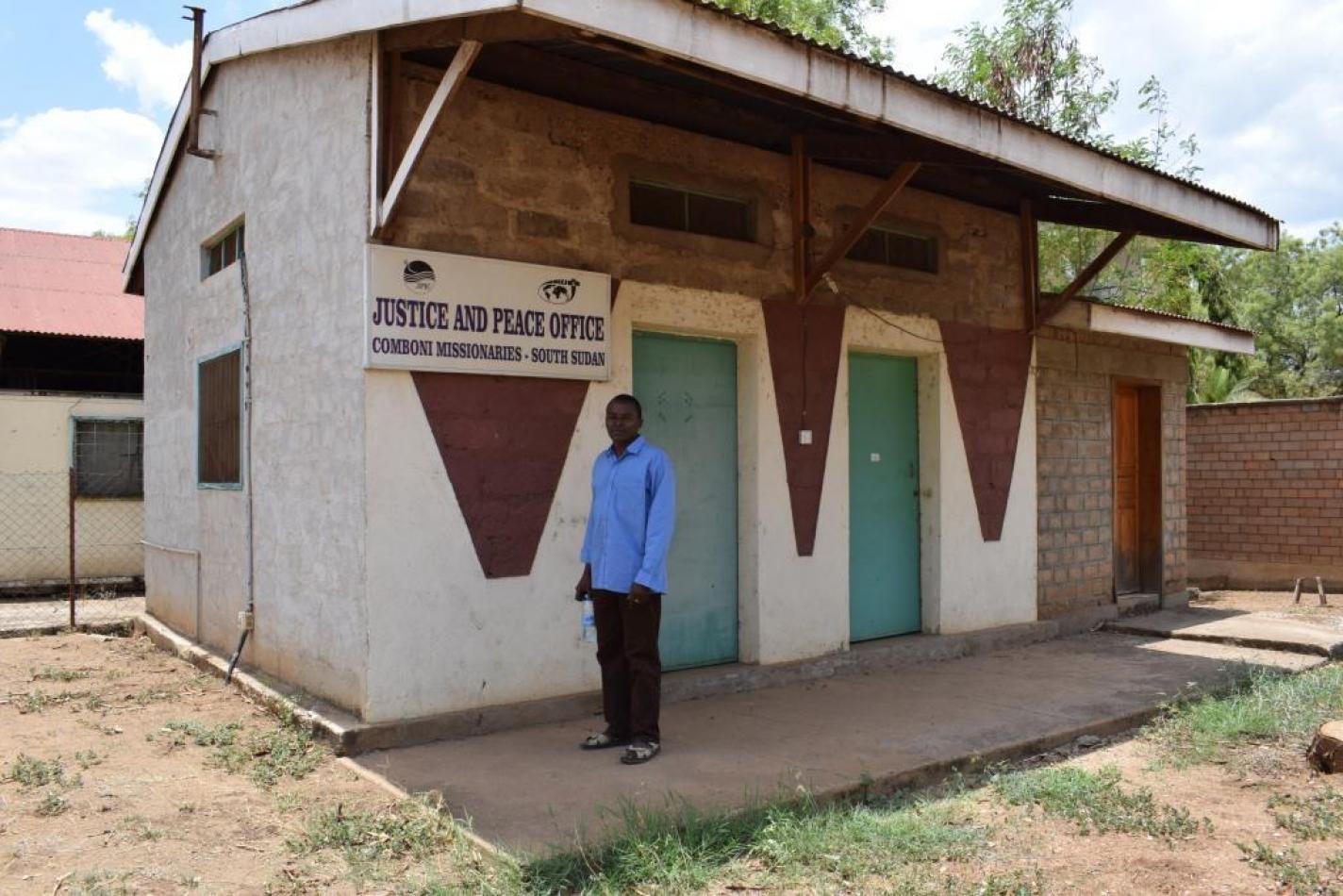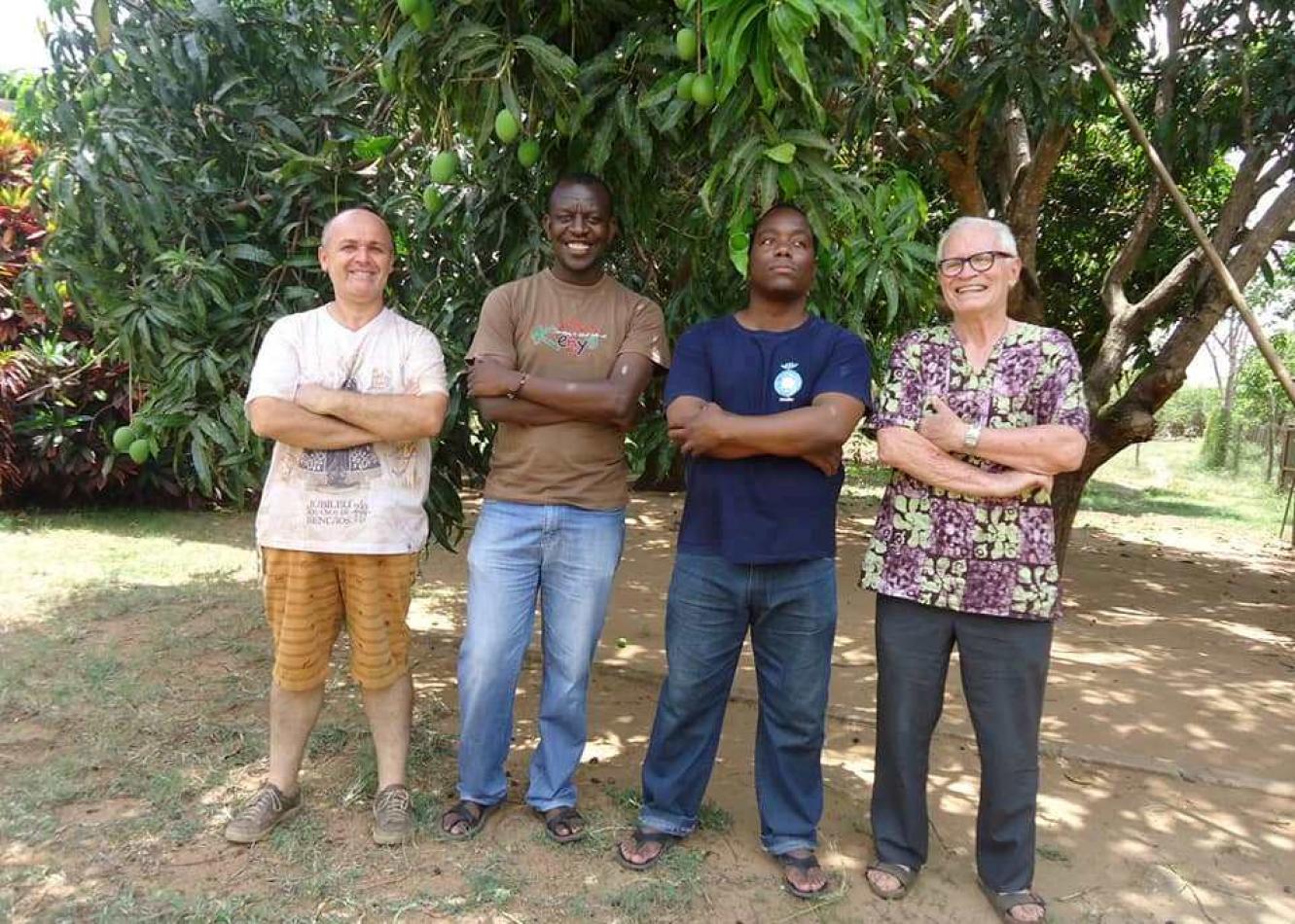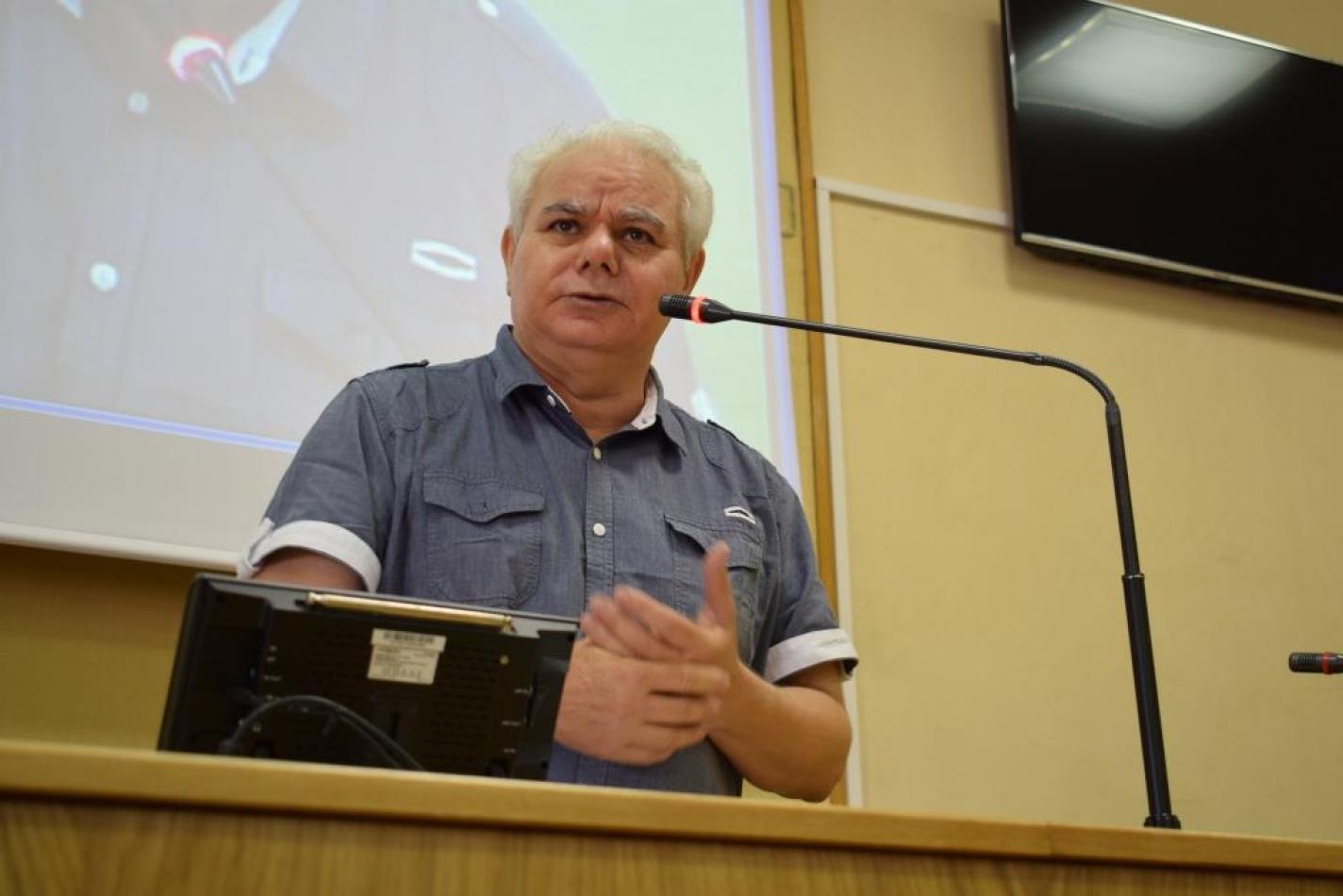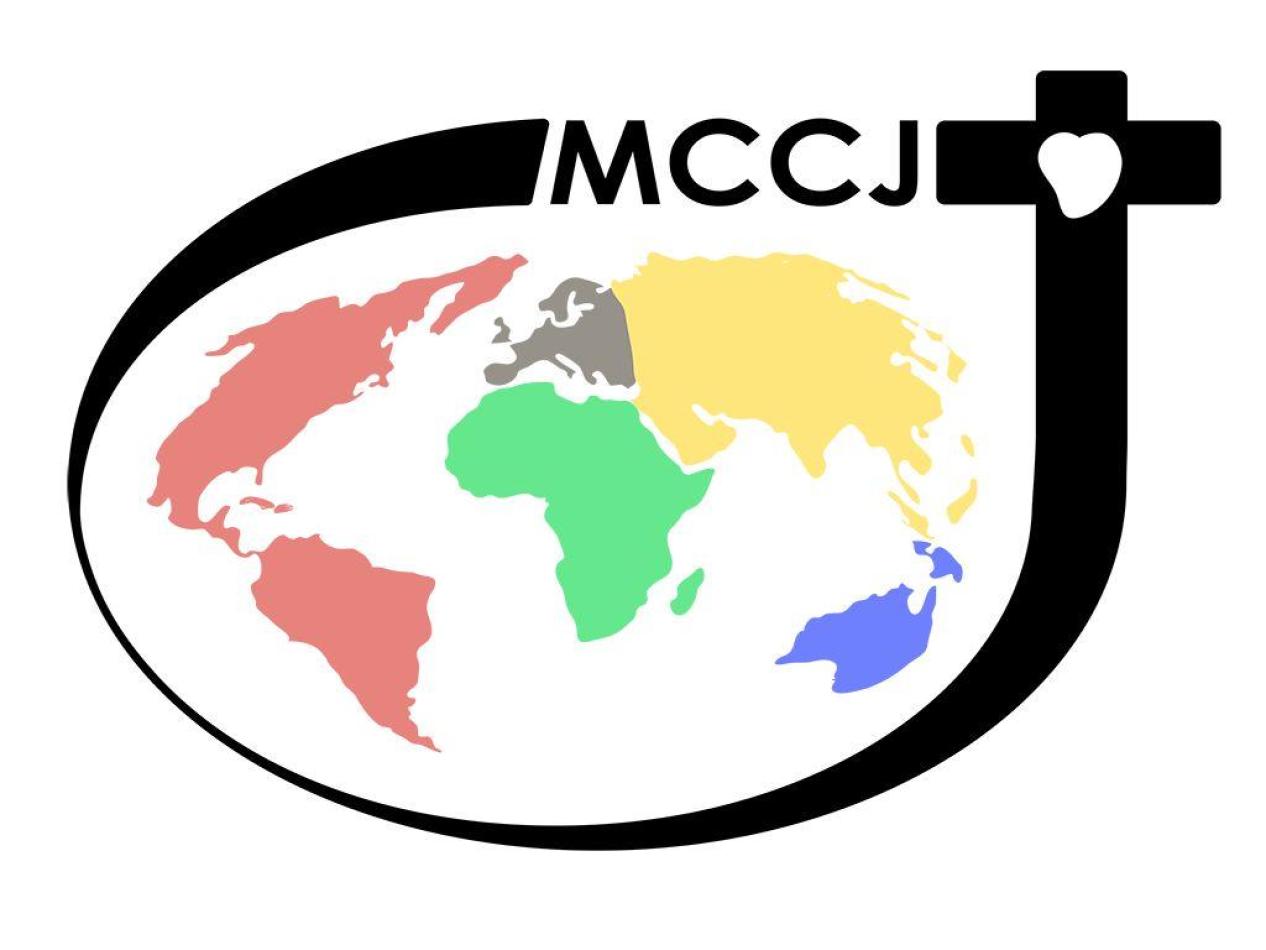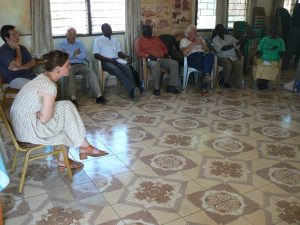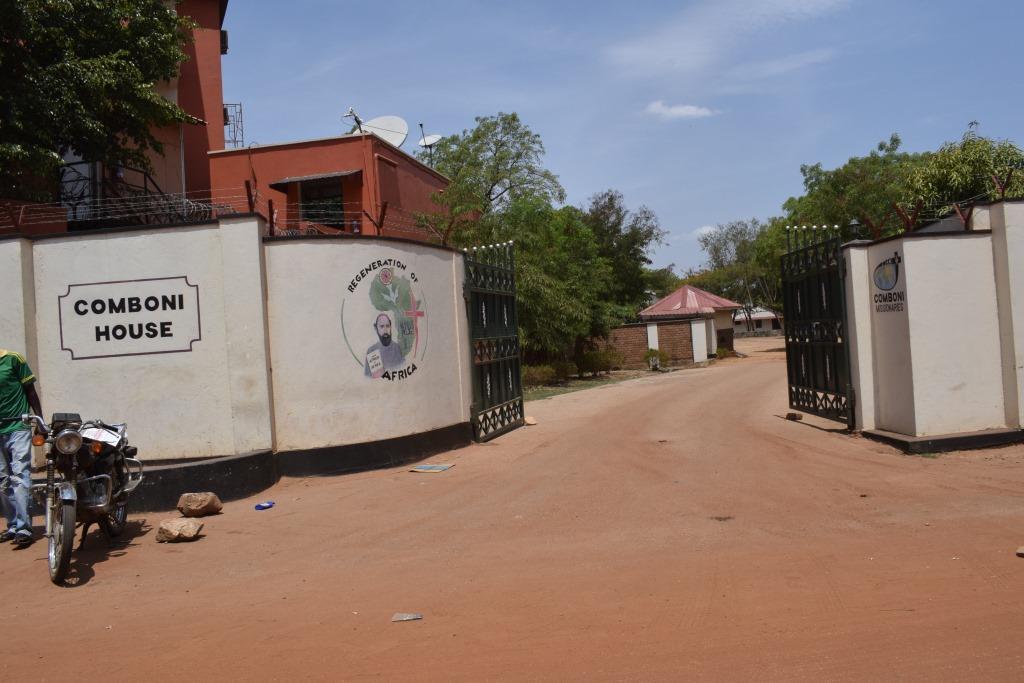Daniel Comboni
Missionários Combonianos
Área institucional
Outros links
Newsletter
Sunday, June 2, 2019
From May 7-9, 2019, we had our workshop on intercultural living and the challenge of ethnocentrism in South Sudan with 16 participants, including Fr Johnson (Palica) and Mr Isaac Kenyi (SSCBC) and 3 Comboni sisters. We invited Fr Basilio and Loes Lijnders from the Justice and Peace department of the Catholic University to give an input and facilitate a discussion.
The focus was on moving from passive co-existence to active co-existence, to embrace diversity and to be aware that each individual is made up of various identities, of which the ethnic origin is not necessarily the defining identity.
The third speaker was Comboni Fr Paolino Tipo who shared his experience of peace building with the Shilluk, Dinka and Nuer in Malakal and proposed concrete steps to building trust. Mr Isaac Kenyi presented his publication of the SSCBS booklet “Tracking Peace Process in South Sudan”. He gave an overview on the stages of conflict since 1991 and had a rather pessimistic outlook if the political and military leadership of South Sudan will not change their corrupt behavior. We also organized a Bible sharing on the topics of justice (Lev 19:11-18; Is 58:1-12), reconciliation (Lk 6:27-38; Col 3:12-17) and fraternity (1 Jn 4:7-21; Prv 3:27-33). The workshop was well received by all, and the discussions were frank and, at times, emotional.
Our Commitment as Missionaries to be Witnesses of the Father in Heaven
Reflections after the Comboni Workshop on Intercultural Living and the Challenge of Ethnocentrism
(May 2019)
I am aware that the process of reconciliation that is supposed to bring peace to South Sudan is fragile and slowed down by obstacles that come from an ethnocentric mindset which determines the actions and decisions by all sides in the conflict. This is not a judgment, but simply an observation of the “cultural DNA” of tribes in this region, and in the past, it was the only way of surviving in a hostile environment. But the same behavior destroys the foundation of a modern state that needs to serve all citizens equally with an impartial administration. After listening to several contributions at the workshop by South Sudanese participants (mainly from the Greater Equatoria Region), I am more pessimistic than ever that there is a political, negotiated solution to the civil war in the near future.
Let me reflect in this article on what gives us an identity and answers to the human need of belonging. The apostle Paul writes in Gal 3:27-28 “As many of you as were baptized into Christ have clothed yourselves with Christ. There is no longer Jew or Greek, there is no longer slave or free, there is no longer male and female; for all of you are one in Christ Jesus.” Does the Christian (the Catholic) identity form or define you more than any of your other identities that you possess? Did you ever think about the fact that you possess several identities at the same time, and in different periods of life one or another identity might be more relevant than the others? Feminists in different countries and cultures perceive that their gender is the most basic identity that overrules everything else. Besides gender, other potential identities are our language/dialect, ethnic group, nationality, age, social class, educational background, sexual orientation, a physical/mental disability, membership in a group, and our worldview (religious conviction), etc. Several ethnic groups in Africa live across national borders where individuals might have patriotic feelings for different countries. An elderly missionary might feel more understood by missionaries of other countries, but of the same age, than by a young missionary of his own country. One of the exercises during the workshop was a personal identification mapping. A person might go through a crisis if the self-identification does not match with the identification by others, e.g. a citizen with migrant parents who is not accepted in the country where he was born. And it made us aware how we unite naturally various roles and identities in our lives, often unconsciously. Identities may change or may be interpreted differently over time, including the ethnic background that seems so predominant in South Sudan. There is always a whole range of factors that inform us who we are and determine how we act.
In view of the role of the Church in bringing reconciliation and unity among different tribes, it is a tragedy that the common faith in the triune God and his work of salvation (self-giving love!) does not influence notably the decisions of the majority of South Sudanese in time of conflict/crisis. According to the New Testament, our spiritual re-birth in Jesus Christ should be the defining identity of a Christian, and especially of a Catholic religious. (Notably, for several Comboni Missionaries it seems that their belonging to our Institute is rather a superficial identity which can be tolerated as long as they have an undivided heart for the Lord). The early (NT) Church knew also some ethnic tensions between Jewish and Pagan Christians but their faith experience enabled them to grow beyond human categories of dividing people and to make the common calling of their Master and Shepherd the foundation of having fellowship. A second aspect of their unity was the social and economic exclusion that many Christians suffered. Christianity began as a movement of marginalized and slaves. Paul observes: “Consider your own call, brothers and sisters: not many of you were wise by human standards, not many were powerful, not many were of noble birth. But God chose what is foolish in the world to shame the wise; God chose what is weak in the world to shame the strong; God chose what is low and despised in the world, things that are not, to reduce to nothing things that are, so that no one might boast in the presence of God.” (1 Cor 1:26-29) The only way for a privileged person like St. Paul to join the Church was to live in solidarity with those who are less privileged (cf. Lk 14:12-14; 18:22). This established a counter-culture – and even does today. The identity-marker of the Christian movement is that they obey the God who saves the afflicted and who demands compassion for the weaker members of society (Ps 12:5; 72:12-14; Dtn 10:16-19; 24:14-15; Jas 2:1-5).
I believe that one reason for the success of spreading Christianity in South Sudan was the fact that it appealed to the refugees and IDPs (internally displaced people) who suffered the grip of the authoritarian Muslim regime. They were under oppression like the Israelites in Egyptian slavery. But when the common enemy was defeated and independence reached, we discovered that the Christian identity often is an outside layer of people who still feel they belong first of all to a clan and a tribe. The Christian faith is lived within a tribe, but inter-tribal solidarity and love is not yet internalized in South Sudan. When Jesus appears in John 21 to the disciples at the lake Gennesaret, it seems that they still had to come to terms with the resurrection, although the first encounter with the risen Lord had been already powerful. The Gospel writer notes that it was already the 3rd time that Jesus appeared to them (Jn 21:14), and the disciples are still portrayed as hesitant. There were several encounters with the Christian faith in South Sudan, but I would say in line with the Gospel that there is need for the Lord to appear another time to deepen the Christian identity of those who come to church.
One particular aspect of an (ethnic) identity is that it divides people in those who are inside and those who are outside. Sometimes we say that Christianity has abolished all boundaries. There is a truth in this, but I want to point out that also for the Church (or the global Christian movement), there is a division between those who are inside and those wo are outside. But it is lived differently, at least if we study the New Testament. Paul distinguishes: “So then, whenever we have an opportunity, let us work for the good of all, and especially for those of the family of faith.” (Gal 6:10) There is a special attention for the Christian brethren (cf. Jas 2:15-16). It seems that the first place to learn and exercise Agape (divine love) is the church community. Then, a Christian is enabled also to reach “outsiders” with the love God has filled us with (cf. Rm 5:5). Also Jesus distinguishes between disciples and persecutors who are not his followers: “But I say to you that listen, Love your enemies, do good to those who hate you, bless those who curse you, pray for those who abuse you.” (Lk 6:27-28) Jesus can only demand love for an enemy if there are real enemies. Jesus did not teach that we should love all people because, in reality, there are no enemies. The opposition towards and rejection of the Gospel is real, but love reaches out to those who are “outside”. Instead of covering up differences (ethnic or others) and pretending that all humans are one, it is more sincere to be rooted in a particular identity (ethnic or other), but to follow the example of Jesus self-giving love which reaches beyond the circle of his followers.
Among the many recommendations of the participants, it was pointed out that it is not possible to help reconcile the country if there are unreconcilable differences within the leadership of the church (SSCBC and each diocese) and lay Catholics of different ethnic origin. Maybe we need to begin small on the grass-root level. Each of us missionaries lives in a community. How do we practice brotherly love according to the Gospel? Does it not happen all too often that people end up living parallel lives? The workshop called this “passive co-existence”. The challenge is to practice “active co-existence” which involves mutual sharing, respect and all the other values that make a society more Gospel-like. Diversity is an asset, an enrichment, and not a threat (although it can be questioned whether ethnocentrism in this country really is a result of diverse cultures. At least for Dinka and Nuer, the conflict flows out of the same cultural worldview which makes clans, sub-tribes and tribes compete over limited resources). It was stated several times during the workshop that our Church needs to practice within her own ranks the message she wants to share with the citizens of South Sudan.
There is also the need to speak the truth of what has happened or is currently happening in the country so that it leads to justice (Is 1:15-17; 10:1-2; 58:6-12). Without justice, there is no lasting peace and reconciliation. Silence perpetuates injustice. This aspect of the social doctrine of the Church is based in the “identity-marker” mentioned above that our God is not god of the powerful who gain victory with whatever means (Mk 10:42-45). The God of the Bible is on the side of the afflicted. All who have this yearning shall gather in the Church, convert from their own wrong-doings and build a community of mutual respect among more privileged and less privileged people.
The participants of the workshop have a clear understanding that the (almost) hopeless situation demands an even more determined presence of the Church and of our missionary commitment to let the Gospel penetrate the culture of all tribes. There is one Creator and saving Father in heaven which means that humanity has one common destiny and South Sudanese have each an equal and inviolable dignity. This dignity needs to be preserved, and each South Sudanese needs to learn to preserve the dignity of his/her fellow citizens.
The complete list of suggestions from the workshop participants:
- Pray constantly for South Sudan
- Do what we preach (life witness) and reconcile inside the Catholic Church
- Have a prophetic role as Church/churches denouncing injustice and speaking truth
- Transmit the faith and the Gospel values in small Christian communities (SCC) and through Bible sharing
- Reach out especially to youth and prepare them with relevant topics on human and Christian maturity because they are the future generation to build a better society (holistic formation)
- Prepare future leaders of South Sudan and get involved in formal education (primary, secondary, tertiary)
- Bring people of different ethnic origin together to know each other and to work together in the Church
- Introduce the topic of ethnocentrism/tribalism in all diocesan programs and Church schools
- Offer a platform for JPIC activities in the South Sudanese Church (website, office?) to share information, experiences and resources in the country and to provide a monitoring mechanism on all Church activities
- Have national youth masses in Juba with representatives of all ethnic groups that bring the hope of the Gospel to their communities
Fr. Gregor Schmidt, Comboni missionaries

